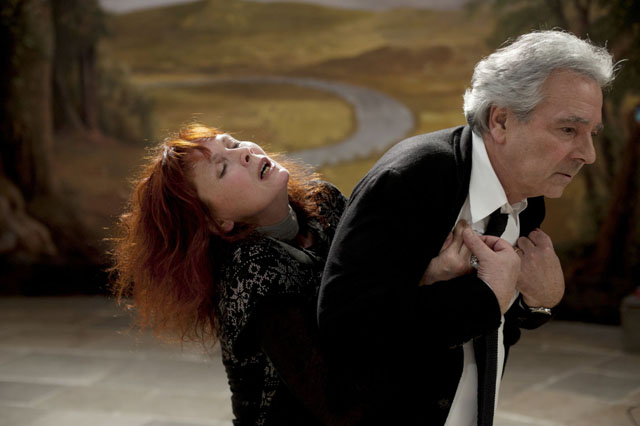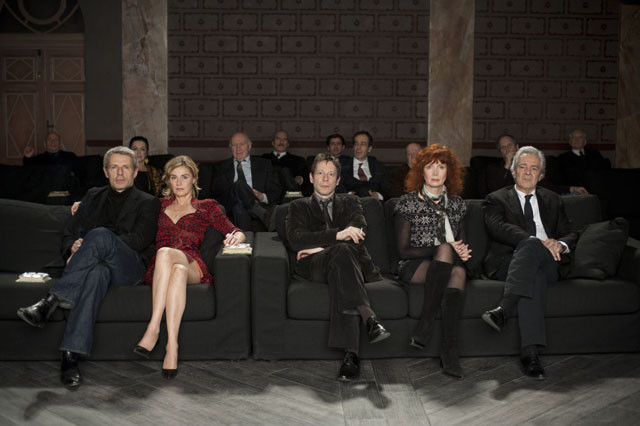A couple of notes before I start pointing you to the first round of reviews. Some critics are referring to You Ain’t Seen Nothin’ Yet! (Vous n’avez encore rien vu) as Alain Resnais’s swan song. After all, he’ll turn 90 on June 3. But, as we happily noted last week, he’s already setting up his next project, Aimer, boire et chanter, a comedy based on Alan Ayckbourn’s play Life of Riley. Secondly, Jonathan Rosenbaum‘s just posted a one-paragraph primer on Resnais and, of course, it’s lovely: “A poet of memory and emotion, he often gets mistaken for an intellectual (perhaps because he’s French) and overlooked as a Surrealist. Indeed, part of the richness of his films can be found in the fact that many of their treasures are hidden, apart from their beauty and feelings.”
Amy Taubin, dispatching to Sight & Sound, is aware of the upcoming project: “Nevertheless, the governing concept of YASNY is that of the posthumous work, a concept that is then overturned, and perhaps overturned again. A group of actors”—and let’s go ahead and name a few: Mathieu Amalric, Pierre Arditi, Sabine Azéma, Anne Consigny, Michel Piccoli, Lambert Wilson, Hippolyte Girardot—”have been summoned to what they believe is the wake for the writer of Eurydice, a modern adaptation of the myth of Orpheus and Eurydice, in which they all performed. They are asked to view an experimental film version of the play, but, being actors, they are incapable of sitting still and watching a movie; instead they are irresistibly drawn into recreating the characters they played when they were much younger. Film space and theatrical space merge and separate and merge again until who knows which is which.”
Writing at the AV Club, Mike D’Angelo is “surprised, looking at today’s reviews, to see a fair amount of very polite disdain” for this “lovely, elegiac” film. “The sticking point for many appears to be Eurydice itself, though I found Anouilh‘s pragmatic take on the nature of romantic love eloquent and bracing. Admittedly, Resnais has trouble sustaining his ambitious conceit for the entire running time, and the film’s second half comes closer to being a straightforward theatrical adaptation, concentrating mostly on Arditi and Azéma as Orpheus and Eurydice. But the sight of mostly middle-aged (and older) actors performing roles intended for the blush of youth; the intense emotion with which Resnais’s stable relives their work with an artist who’s just passed away; the tension between the theatrical and the cinematic (a longtime Resnais obsession) as refracted through the juxtaposition of Resnais’s classical mise-en-scène with the rehearsal footage’s more modern, freewheeling visual style (the latter having been shot entirely separately by Bruno Podalydès)… it all unmistakably suggests a fond farewell, providing the source material with a deeply moving extra-textual undercurrent. That Resnais gives one of the young actors the final shot speaks volumes.”
“Resnais watchers won’t fail to see this as a knowing footnote to his career,” writes Jonathan Romney in Screen. “Essentially a ghost story (shades of Last Year in Marienbad), and one that substantially echoes his multi-layered Life Is a Bed of Roses, the film is Resnais’s latest (and most elaborate) variant on the theatrical explorations of his Alan Ayckbourn films (notably Smoking/No Smoking), as well as a reprise on the shape-shifting musings on life and death in Providence. And there’s a poster for Hiroshima Mon Amour in there too. Unashamedly experimental, the film is sumptuously, even rapturously mounted, with glowingly atmospheric photography by Eric Gautier, and imposingly protean design by Jacques Saulnier. It’s also a triumph for editor Hervé de Luze, orchestrating a dizzying system of tightly synchronized cuts, as well as a playful array of iris shots, split screens, intertitles et al. The film is slippery right up to the minor-key coda, and the final touch, a Frank Sinatra song over the end credits, is a lovely melancholy sign-off from a venerable auteur whose intellectual and philosophical energy are undimmed.”
“Like most of Resnais’s work, it concerns the constant, complex interplay between ‘reality,’ memory, imagination and desire,” writes Geoff Andrew in Time Out London. “Thanks to the choice of material, death also looms large, though not at all threateningly; the ghosts here are simply the feelings we have experienced. The film is touching, but more than that it’s wise, witty and thought-provoking.”
“More intriguing to consider after the fact than it’s to actually sit through, You Ain’t Seen Nothin’ Yet! is, at bottom, excessively wordy and a bit of a drag,” writes Budd Wilkins at the House Next Door. “Luckily, the film is enlivened somewhat by inventive mise-en-scène, as well as some lissome camerawork. The staging is so endlessly, even incestuously, self-referential as to earn the epithet mise-en-abyme, a term derived from what happens when you place two mirrors opposite each other, producing an infinite reflection, as in the famous hallway shot from Welles’s Citizen Kane.”
“At first, this meta-production about the process of artmaking is both breakneck and funny,” writes Glenn Heath Jr. for the L. But the “darkly comic tone of the opening scenes turns self-congratulatory rather quickly, becoming a veritable hangout session between Resnais performers selfishly reinvigorated by old material…. This is Resnais’s Ocean’s 11.”
For the Guardian‘s Peter Bradshaw, “despite its moments of charm and caprice, the film is prolix, inert, indulgent and often just plain dull.” More from Peter Debruge (Variety), Eric Kohn (indieWIRE), Fabien Lemercier (Cineuropa) and Todd McCarthy (Hollywood Reporter). And you can listen to the press conference.
Updates, 5/24: “Last time in Cannes, with Wild Grass, the director remarked that he is often mistaken to be a filmmaker of memory when in fact he believes he is one of imagination,” recalls MUBI’s Daniel Kasman. “Indeed, You Ain’t Seen Nothin’ Yet! isn’t so much about the process of these actors recalling a past performance, but rather the process of them projecting themselves imaginatively into their young selves, into memories of performing with the others, into the fiction of the plays…. The context is of a wake or funeral but one that calls up new life through recollection and reliving.”
Michael Oleszczyk at Hammer to Nail: “Having seen Emmanuelle Riva—the star of Resnais’s Hiroshima, mon amour—playing a dying woman in Haneke’s Love a mere day before You Ain’t Seen Nothing Yet!, it’s difficult not to reflect on the slow departure of a generation responsible for most of mid-century cinema revolutions. Resnais’s film is both an elegy and a song of hopeful praise: just as Orpheus’s hope to reclaim Eurydice brings him into the netherworld and back, cinephilia seems to be alive and salvaging cinema from the web’s continuing assault on our time and attention. The promise of the title makes Resnais’s own projected departure feel less like a final goodbye.”
Update, 6/4: Boris Nelepo in MUBI’s Notebook: “‘The playwright’s duty,’ Jean Anouilh, French dramatist, once wrote, ‘is to produce plays on a regular basis. Actors must go out onstage every night for the audiences who come to theatre to forget about death and hardship. If one of the plays is found to be a masterpiece, well, so much the better.’ Alain Resnais has stuck to this ethos for a couple of decades now, enriching his already stellar back catalogue with some brilliant autumnal work, but You Ain’t Seen Nothin’ Yet is a veritable masterpiece on par with his major accomplishments.”
Cannes 2012 Index: a guide to the coverage of the coverage. For news and tips throughout the day every day, follow @KeyframeDaily on Twitter and/or the RSS feed. Get Keyframe Daily in your inbox by signing in at fandor.com/daily.





